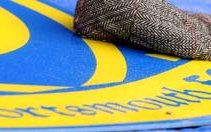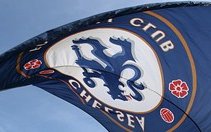Jimmy Allen. Not a name that immediately springs to mind as either a Pompey or Villa legend, but one that should be a worthy candidate into either clubs Hall of Fame.
It was at a reserve match in February 1930 that a Pompey crowd first saw a 20-year-old trialist from non-league Poole Town show his potential and make a impression good enough to be signed-up for £1,200. Little did they know that the 6ft Centre Half was shortly to become a part of Fratton folklore that would live on long after his career and indeed his life, had ended.
During the first couple of seasons Allen firmly established himself as a priceless asset to Pompey and quickly became regarded as one of the most outstanding defenders in the country.
Jimmy played every game in the 32/33 season but it was to be the following campaign that would see him reach his peak by representing; his country against Northern Ireland and Wales, his League in the Inter-League match against the Scottish League as well as helping Pompey to reach their second FA Cup Final in five years.
Pompey’s opposition at Wembley was to be Manchester City, the previous seasons beaten finalists. City had dispatched Aston Villa 6-1 in their semi-final with four goals coming from the prolific Fred Tilson. Pompey meanwhile had secured their place in front of 55,000 at St. Andrews thanks to a hat-trick by Jack Weddle and another from Sep Rutherford in a 4-1 win against Leicester.
Pompey’s ticket allocation for the final was, by today’s standards, a measly 7,500 but having received over 30,000 applications it was inevitable that the Black Market trade would be rife, so it proved with the ‘expensive’ 7s 6d seats selling at £2, and the cheaper 2s 6d seats going for as much as 16 shillings – That’s 80p to me and you!
It’s highly likely that more than 7,500 of the 93,258 who made up the crowd on April 28th 1934 were Pompey fans, but one thing is for sure they got wet! The final was played out during a thunderstorm, which made the ground very sluggish, and slow… nonetheless both teams were determined to take the cup home.
It was Pompey, with their defence marshalled by Allen, who looked the strongest, and on 28 minutes City’s keeper Frank Swift failed to hold a shot by Rutherford and watched in vain as the ball spun away and curled in the corner of the net. Pompey were 1-0 up and it was remain that way until half time.
It has been suggested that during the interval, Swift the youngest player in the City team, started blaming himself for conceding the goal. Tilson, City’s bustling forward is supposed to have approached Swift and said, “You don’t need to worry, I’ll plonk two in, in next half”.
Pompey in their white shirts and black shorts however stood firm and Tilson & Co were unable to penetrate Allen’s defence until that was, with 73 minutes on the clock, Jimmy suffered a severe head injury and had to leave the field of play. As substitutions were not allowed, City now had, even when the concussed Allen returned, a man advantage.
City’s game stepped up immediately, a young twenty something named Matt Busby took a throw and played in Brook, who in turn played the ball through to Tilson, who with plenty of time to spare and the Pompey keeper Gilfallan out of position, placed the ball home. 1-1.
There was however more to come, as with three minutes to go, Tilson being true to his word, latched on to a cross, to rifle the ball home and to put City in the driving seat.
Pompey had little energy or time left to respond and as Referee Stanley Rous (to become FIFA President, 1961-1974) blew the final whistle City keeper Swift (who later went on to captain England) fainted in relief.
Meanwhile back in Portsmouth rumours spread that Jimmy Allen had died from the head injury he sustained during the game. Luckily they proved to be false but a month or so later further rumours ran through the city that Allen was to be sold to Aston Villa. These too were quashed when on June 18th Allen signed for another season… or not, as the following evening they were seen to be accurate when the British transfer record for a defender was smashed and after 131 Pompey appearances, Allen moved to Villa for £10,775. The cause of the turnaround? Villa had offered Allen £200 more than Pompey.
The cup final appearance meant a profit of £10,592 on the year but with Fratton Park in need of repair there was work to be done. It took until Christmas 1934 for the board to reveal their plans. A new covered ‘North Stand’ was to be built and when complete, would increase the ground capacity above 58,000, 30,000 of which would be under cover. The work was to be financed by the proceeds of the sale of Jimmy Allen – From that day on, the North Stand would be known throughout the club as the ‘Jimmy Allen Stand’.
Being the country’s most expensive player was an immediate burden on the amiable Allen as he took time to settle at his new club. Jimmy found himself under immense strain leading to some discontent amongst Villa fans who were less than happy at their club parting with such a large sum for a man they saw as a rather negative player. They liked their centre-halves to join in the attacking play, Allen however operated principally as a stopper.
Not surprisingly his early form was disappointing but Jimmy remained calm, and despite the trauma of relegation from the First Division in 1936 it wasn’t long before he had proved the doubters wrong. Revealing the form which had earned him his two England caps he skippered the Midlanders to the Second Division championship in 1938.
Like so many players of his generation, Jimmy was denied the chance to explore his full potential by the outbreak of the Second World War and after guesting for Fulham, Pompey and Birmingham during the war, he was forced to retire in 1944 through injury.
But it wasn’t long before the pull of football came around again, and in 1948 he became manager of non-league Colchester United, leading them into the Football League when the Third Division (South) increased in size in 1950. After two seasons of consolidation Colchester’s position, Allen’s side fell away and in the spring of 1953 he resigned to become a pub landlord in Southsea.
It’s said that from behind his bar, Allen readily recounted tales of his playing days, but never once discussed the possibility that had he not been injured, we might have beaten Manchester City on that fateful April day in 1934 – Having researched the player and various accounts of the match, I’m certain we would have.
In 1988 the North Stand was re-cladded and during its construction Jimmy made a sentimental trip to Fratton Park to see, what was to be for one final time, the stand which had jovially carried his name for so long.
James Phillips Allen died in Southsea on 5th February 1995 at the age of 85.
Written by Chix.
The views within this article are the views of the individual who wrote and submitted this piece, sometimes solely theirs. They are not necessarily shared by the Vital Pompey Site Journalists.
To join the Vital Pompey debate – in the forum or with comments on articles – simply take a few seconds to register an account.



